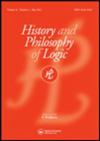皮尔斯的思辨语法:作为符号学的逻辑
IF 0.5
3区 哲学
Q3 HISTORY & PHILOSOPHY OF SCIENCE
引用次数: 0
摘要
哥白尼革命)体现了胡塞尔回归事物本身的原则。专注于数学概念可以弥补哈蒂莫阅读的两个弱点。它提供了一个更好的描述数学家的目标,不同于他们的实践,它可以加强哈蒂莫对胡塞尔方法的多元解释。把数学概念放在首位,增加了非反现实的多元立场的可辩护性。本文章由计算机程序翻译,如有差异,请以英文原文为准。
Peirce's Speculative Grammar: Logic as Semiotics
Copernican revolution) instantiates the Husserlian principle of going back to the things themselves. Focusing on mathematical notions can shore up two weaknesses of Hartimo’s reading. It provides a better account of mathematicians’ goals, as distinct from their practices, and it can strengthen Hartimo’s pluralistic interpretation of Husserl’s approach. Giving primacy to mathematical notions increases the defensibility of a pluralistic position that is not anti-realistic.
求助全文
通过发布文献求助,成功后即可免费获取论文全文。
去求助
来源期刊

History and Philosophy of Logic
综合性期刊-科学史与科学哲学
CiteScore
0.80
自引率
0.00%
发文量
24
审稿时长
>12 weeks
期刊介绍:
History and Philosophy of Logic contains articles, notes and book reviews dealing with the history and philosophy of logic. ’Logic’ is understood to be any volume of knowledge which was regarded as logic at the time in question. ’History’ refers back to ancient times and also to work in this century; however, the Editor will not accept articles, including review articles, on very recent work on a topic. ’Philosophy’ refers to broad and general questions: specialist articles which are now classed as ’philosophical logic’ will not be published.
The Editor will consider articles on the relationship between logic and other branches of knowledge, but the component of logic must be substantial. Topics with no temporal specification are to be interpreted both historically and philosophically. Each topic includes its own metalogic where appropriate.
 求助内容:
求助内容: 应助结果提醒方式:
应助结果提醒方式:


